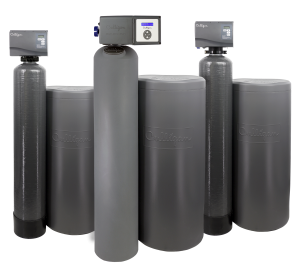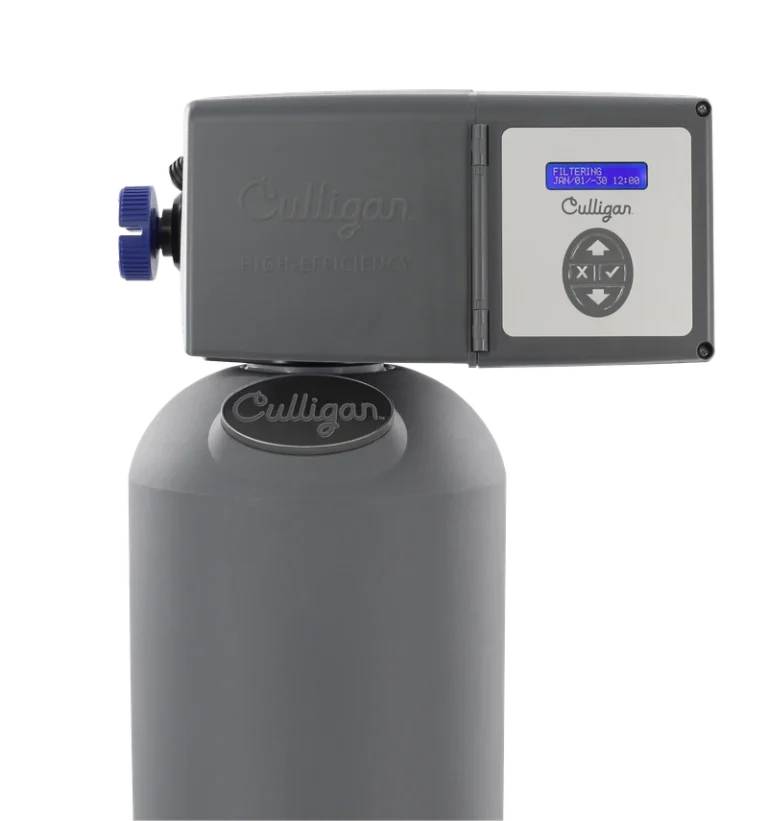Iron & Rust in Ventura Water: What You Should Know
If you’ve noticed yellow water, brown spots, or a metallic taste in your tap water, you’re not alone. Across Ventura and Ventura County, residents are increasingly seeing signs of iron contamination in their water supply—especially in older homes and neighborhoods with aging infrastructure. While iron is a naturally occurring mineral that the body needs in small amounts, elevated levels of iron can lead to rusty water, plumbing damage, and even health concerns.
Let’s explore how iron particles end up in Ventura’s water, the risks of iron overload, and how Culligan of Ventura can help you restore clean, safe water in your home.

Four Types Of Iron
Understanding the different types of iron found in Ventura’s water, their potential impacts, and effective solutions can help homeowners mitigate damage and maintain a clean, pristine living environment.
Red Iron
Ferric “insoluble” iron is visible to the naked eye and can cause a number of issues with your home, as well as in your food and drink. Red water iron can be removed by a water softener, but a more common treatment is an iron filter, which Culligan offers as a part of its whole home solutions. The state-of-the-art Iron-Cleer® water conditioning system solves iron and rust staining, leaving you with nothing but clean water in your sinks, fixtures, dishes and clothes.
Clear Iron
Ferrous “soluble” iron is an invisible dissolved solid that can appear after coming out of your faucet. This type of water is low on oxygen and typically comes from deeper wells and groundwater sources.
The most common way to treat clear iron is with a Culligan Water Softener, which can remove clear-water iron through ion exchange, particularly if your home’s water supply has a low pH. Other options, such as chlorination and manganese greensand filtration require maintenance and the proper amount of pressure.
Organic Iron
Generally, organic iron is pure iron combined with any dissolved organic matter in the water, such as tannins. A tannin is a biomolecule produced by vegetation that stains liquids, including tea and coffee. When tannins react with water containing iron, it creates a black residue. This usually occurs in shallow wells that are affected by groundwater.
Iron Bacteria
Iron bacteria are naturally occurring organisms in soils and groundwater that feed off iron, leaving waste deposits. They leave behind a dark sludge that sticks to pipes and fixtures, particularly in your water and toilet tanks and plumbing fixtures. The microorganisms also can lead to bad tasting and odorous water. You can physically remove the sludge from your toilet tank or use “shock” chlorination methods, but this is merely a temporary solution. The only way to reduce the amount of iron bacteria is to reduce the amount of iron itself.
What Causes Rusty or Discolored Water in Ventura?
Ventura’s water comes from multiple surface water and groundwater sources, including the Ventura River, Lake Casitas, and local groundwater basins. While the City of Ventura’s Water Division and the Casitas Municipal Water District monitor and treat public water to meet EPA drinking water standards, residents may still experience cloudy water, orange water, or discolored water due to a number of local factors:
- Corroded pipes—especially galvanized pipe in older homes
- Iron-rich soils and naturally-occurring sediments
- Biofilm bacteria water buildup from iron bacteria
- Copper corrosion causing blue-green stains and bitter taste
- Disturbances in the water system after public utility maintenance
- Water heater sediment buildup and rusting
- Leaching from faucet washers, valves, or hose bibs
Even in areas served by a municipal water supply, problems can originate inside your home’s plumbing, particularly after plumbing repairs, water meter replacement, or aging hot water heater systems.
How Can Iron Invade Your Well Water?
Iron can invade your well water through several natural and environmental processes:
- Natural soil and rock: California’s geology contributes to iron-rich mineral content in groundwater.
- Corroded plumbing: Iron pipes can rust, releasing flakes into your heated water and cold water lines.
- Rainwater infiltration: Surface water runoff from industrial waste or urban areas can carry iron into aquifers.
- Groundwater movement: As rainwater and snowmelt seep through the soil, they absorb minerals like iron.
- Iron bacteria: These microbes flourish in iron-rich environments, further degrading water quality.
Collectively, these factors can result in elevated levels of iron in well water, leading to various issues such as staining, metallic tastes, and potential damage to plumbing and appliances.
Solutions
Suggested Products

Aquasential™ Smart High Efficiency Water Softener
- Smart brine tank auto-monitors salt levels
- Convenient auto-bypass valve
- Reliable non-corrosive valve
- Worry-free maintenance

Aquasential™ Smart High Efficiency Whole House Water Filters
Reduce sediments in your water and contaminants that cause your water to appear, taste, and smell unpleasant. Your system can also lessen the taste and odor of chlorine, and prevent pipe damage and staining from low pH water. Additional customizations include:
- Culligan® Filtr-Cleer® Water Filters – Reduces Sediment Problems
- Culligan® Cullar® Water Filters – Reduces Taste and Odor Problems
- Culligan® Cullneu Water Filters – Reduces Acid Problems
Common Water Quality Issues from Iron in Ventura
Rusty stains on sinks, tubs, or toilets are often the first clue that something’s wrong. But the effects of high iron content in water go beyond appearances:
1. Rust Particles & Iron Stains
Excess iron—especially ferric iron—can oxidize and stick to any surface it touches. This creates hard-to-clean rust marks and calcium buildup on plumbing fixtures and shower heads, often requiring commercial rust removers or chlorine bleach to scrub away.
2. Cloudy or Murky Water
If your tap runs with cloudy water, murky color, or white water, you might be dealing with air bubbles, iron, or other particles in water. When water looks unclean, it raises questions about the level of cleanliness and safety for everyday use.
3. Metallic Taste or Foul Odor
A metallic taste in your glass of water, or a foul odor, is a strong indicator of iron or copper corrosion. This can be more noticeable in lukewarm water or warm water drawn after the hot water heater has sat idle.
4. Biofilm & Slimy Buildup
Iron bacteria thrive in environmental waters with high iron, creating slimy buildup in pipes and a ring of film around faucets or inside your toilet tank. This can lead to bacteria in drinking water, and in some cases, increase the risk of algae-affected drinking water or other petroleum-related contamination.
Is Iron in Ventura Water a Health Risk?
While iron is not typically regulated as a primary health hazard, prolonged exposure to high levels of iron may have human health implications, particularly in combination with other contaminants like chlorine disinfection byproducts, arsenic, or excess sediment.
Populations most at risk include:
- Pregnant women
- Infants
- Individuals with hemochromatosis (iron overload disorder)
- Those with compromised immune systems
The EPA’s limit for iron in drinking water is 0.3 mg/L, but even at lower levels, iron may affect taste, smell, and appearance. According to experts, precise levels of various contaminants should be measured by qualified laboratories to determine whether your water is truly safe.
Water Treatment Options in Ventura
At Culligan of Ventura, we offer custom water treatment devices designed specifically for the water sources and contaminants common in Ventura County.
Water Softeners
Culligan’s advanced Water Softeners help eliminate ferrous iron and calcium buildup through ion exchange, leaving you with soft water that’s better for your plumbing fixtures, appliances, and laundry detergent performance.
Water Testing in Ventura
To deal with naturally-occurring sediments and excess sediment, we also offer sediment filters as part of a whole-home solution. If you’re uncertain about what’s in your water, our team provides independent laboratory testing with detailed analysis by certified laboratory personnel.
What You Can Do
- Flush taps using a container with water or gallon of water if water has been stagnant
- Clean faucet screens and aerators regularly
- Install filtration devices recommended by a plumbing expert or licensed plumber
- Use liquid detergents for better laundry performance
Schedule Your Free Water Test in Ventura
If you’ve been dealing with rust stains, cold water discoloration, or a strange taste in your drinking water, now is the time to act. Culligan of Ventura provides free water testing in Ventura, Oxnard, Camarillo, Santa Paula, and surrounding areas.
We’ll identify iron content, levels of calcium, and potential health risks based on your zip code, system, and home plumbing conditions. Our experts will then recommend the best treatment method to restore fresh water to every tap, shower, and appliance in your home.

Facebook